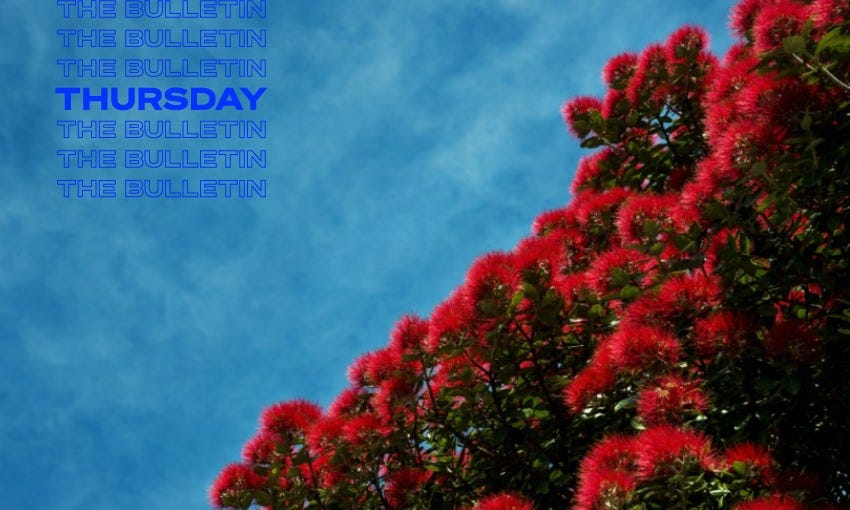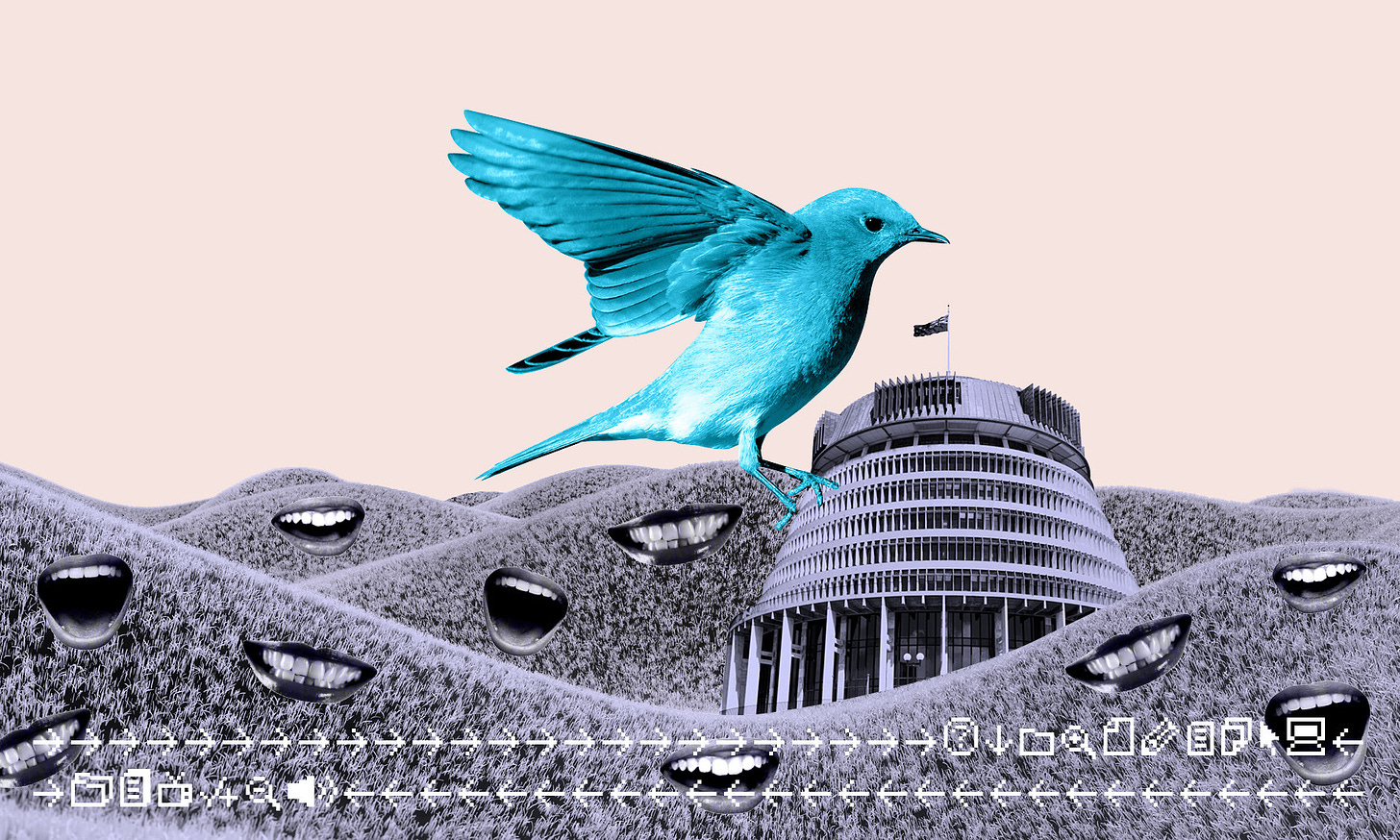Auckland to open by Christmas as elimination ends
On November 29 the prime minister will announce which regions of New Zealand will enter the red and orange Covid levels as the unvaccinated face tough restrictions over the holiday
Mōrena and welcome to The Bulletin for Thursday, November 18, by Justin Giovannetti. Presented in partnership with Z Energy.
In today’s edition: Remains found at Pike River; Thornley retracts Covid paper; Shelly Bay protesters defy council; but first, a plan for Christmas.
Pōhutukawa flowering at Christmastime. (Oneclearvision via iStock/Getty)
The end of Auckland’s hard border. Nearly four months after Auckland went into lockdown, the border around the city will be lifted on December 15. Alice Neville wrote an explainer for The Spinoff about the prime minister’s announcement yesterday. While only Aucklanders who are double-vaccinated or those with a recent negative test for Covid-19 will be allowed to travel, the date will effectively mark the end of the elimination strategy throughout New Zealand.
How the new system will work. The government had earlier sought to find a way to keep cases bottled up in Auckland, with the Covid-19 response minister musing two weeks ago that a hard border could be maintained around the city. However that idea was quickly shelved following widespread opposition. Instead, as Stuff reports, the government has abandoned plans to get all DHBs across the country to 90% vaccination. The only layer of protection will be a number of spot-checks mounted by police around Auckland, which will likely mean few cars will be stopped on the motorway as a flood of Aucklanders leave for the holidays. Experts have warned that case numbers will surge throughout the country.
A date to keep circled in your calendar. While it might not be freedom day, November 29 will mark the next big milestone in the country’s Covid-19 response. The NZ Herald has details on what to expect. For Aucklanders there will be few surprises on that day. The prime minister will likely announce that the Auckland region will enter the red level of the traffic light system a few days later. For the rest of New Zealand, decisions made that day will dictate how people will celebrate Christmas and live for months to come.
The unvaccinated face a tough future. The entire country will enter the traffic light system at the same time as Auckland, but while highly vaccinated regions will enter the more permissive orange setting, those with large outbreaks or low vaccine coverage will join Auckland in red. If you’re in Northland, the east coast and a number of other areas, you’ll want to pay attention. For the vaccinated, little will feel different from today. For the unvaccinated, especially in level two areas, it will be a harsh transition — however, one that follows months of ample warning. As Bridie Witton reports for Stuff, freedoms for the unvaccinated are now shrinking.
The new plan marks the final breakdown of political consensus. Two months ago, Covid-19 minister Chris Hipkins quipped after seeing the National party’s pandemic proposal: “They are willing for Kiwis to get Covid for Christmas”. He’s now regretting those words after signing off on a plan that professor Michael Plank has warned will spread the virus around the country by Christmas. RNZ reports that parliament, apart from Labour, is united in opposition to the next stage of the government’s approach to Covid-19. The Green and Māori parties have said the government is moving too fast and should keep Auckland sealed, while Act and National say the country should open up completely by the end of the month. The political consensus that once supported the elimination strategy has been fraying for months, but is now completely gone.
If you like what you’re reading, we need your support. The Spinoff is doing our utmost to keep you updated on Covid-19 related news. Every dollar our members contribute directly funds our editorial team and is devoted to ensuring we do more. Click here to learn how you can support the team today.
Remains found in Pike River mine, 11 years after explosion. As Stuff reports, the images were taken last week in a new borehole at the disaster site and show the remains of two or three men. They are in the furthest part of the mine from the entrance, making recovery impossible, according to police. Only two days before the 11 year anniversary of the explosion that killed 29 men, the discovery was gutting for families. The police investigation at the site is likely to finish by the end of the year, when it will be turned over to the Department of Conservation.
The Covid numbers: There are 88 cases in hospital and 7 in ICU/HDU. There are now 4,031 active cases in New Zealand. 180 new community cases were reported in Auckland yesterday, 5 in Waikato, 6 in Taupō and 3 in Northland. 21,031 people were vaccinated on Tuesday.
The Spinoff’s Covid data tracker has the latest figures.
Simon Thornley retracts paper with false claims on Covid vaccine and pregnancy. The Spinoff reports that the paper was widely criticised and wrongly claimed that there was a higher incidence of miscarriage among those who have received a Covid vaccination. Thornley is a University of Auckland epidemiologist and leader of the anti-lockdown Plan B group. The retraction followed rare and harsh criticism from the head of the university’s school of population health, where the academic works. Retracting a paper is a very unusual step.
Deadline for Shelly Bay protesters lapses as Wellington council fights on next step. Mayor Andy Foster and a number of councillors signed a motion yesterday to stop the city’s chief executive from removing protesters, citing health and safety reasons, the Dominion Post reports. The city had sought to close the entire site to the public from 6pm yesterday after a new report found high levels of asbestos contamination. Protesters haven’t moved. Instead, the mayor, deputy mayor and five councillors have sought to only limit movements within two metres of a building with asbestos. Other members of council are appalled.
Deaths reported in Canada as extreme flooding surrounds Vancouver. Heavy rain and winds have swept across the Pacific north-west, destroying roads and leading to mass evacuations in British Columbia and Washington state. According to The Guardian, the city of Vancouver is now cut off from the rest of Canada after all its road, highway and rail connections were destroyed by raging flood waters. As The Globe and Mail reports, an atmospheric river, is responsible for the extreme rain over the past days.
What yesterday’s return to school was like for readers of The Bulletin. A number of you answered a call for stories about the return to classes in Auckland and Waikato with a series of lovely vignettes. Some of you get to send your kids to school full-time because of low student numbers (lucky), while others are staggered by grade or surname. Here are two nice moments to share:
From Katie: “Most people were a bit emotionally heightened this morning because it’s so different—both from what school has been like and also because we’ve had our babies at home for 14 weeks, very close to us where we can also feel like we are protecting them. Despite the weirdness, it was really good to be part of a face-to-face community again. I know many whānau can’t send kids to school because they have some who are too at-risk, so I feel privileged”.
From Rachel: “Charlie went to school this morning happily despite saying he didn't want to go. The little guy was up by himself before 7:30am, was fizzing all morning and trotted off through the gates without the usual goodbye hug. It was lovely to see the usual faces, albeit mostly obscured by masks, but he definitely felt a few inches taller than the last time we walked to school together”.
Got some feedback about The Bulletin, or anything in the news?
Get in touch with me at thebulletin@thespinoff.co.nz
(Image: Archi Banal)
Right now on The Spinoff: Shanti Mathias asks whether Twitter has any real impact on New Zealand politics. Mirjam Guesgen has tips about how to have the climate talk with kids. Toby Manhire reports on the challenge ambulance crews confront with a growing Covid threat. Siouxsie Wiles looks at vaccine adverse events and what we can learn about them. Josie Adams speaks with Daniel McIvor about becoming social-media famous after appearing on Police 10/7.
Fijian Drua look to play at home in 2022. The new team could still play at home during its inaugural campaign in Super Rugby Pacific, RNZ reports. The bulk of the squad has assembled in New South Wales and plans to play its first year of home games in Australia. However with Fiji planning to reopen to fully-vaccinated travellers next month, the team is looking at moving some of its home games there.
That's it for The Bulletin. If you want to support the work we do at The Spinoff, please check out our membership programme.







